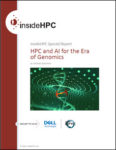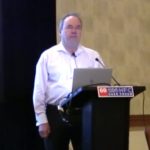This special report sponsored by Dell Technologies, takes a deep dive into HPC and AI for life sciences in the era of genomics. The report also highlights a lineup of Ready Solutions created by Dell Technologies which are highly optimized and tuned hardware and software stacks for a variety of industries. The Ready Solutions for HPC Life Sciences have been designed to speed time to production, improve performance with purpose-built solutions, and scale easier with modular building blocks for capacity and performance.
Precision Medicine pushes demand for HPC at the Edge: AI on the Fly ® Delivers
In this special guest feature, Tim Miller from One Stop Systems writes that by bringing specialized, high performance computing capabilities to the edge through AI on the Fly, OSS is helping the industry deliver on the enormous potential of precision medicine. “The common elements of these solutions are high data rate acquisition, high speed low latency storage, and efficient high performance compute analytics. With OSS, all of these building block elements are connected seamlessly with memory mapped PCI Express interconnect configured and customized as appropriate, to meet the specific environmental requirements of ‘in the field’ installations.”
HPC and Precision Medicine: A New Framework for Alzheimer’s and Parkinson’s
Joe Lombardo from UNLV gave this talk at the HPC User Forum. “The University of Nevada, Las Vegas and the Cleveland Clinic Lou Ruvo Center for Brain Health have been awarded an $11 million federal grant from the National Institutes of Health and National Institute of General Medical Sciences to advance the understanding of Alzheimer’s and Parkinson’s diseases. In this session, we will present how UNLV’s National Supercomputing Institute plays a critical role in this research by fusing brain imaging, neuropsychological and behavioral studies along with the diagnostic exome sequencing models to increase our knowledge of dementia-related and age-associated degenerative disorders.”
Fighting Cancer with Deep Learning at Scale with the CANDLE Project
In this episode of Let’s Talk Exascale, Mike Bernhardt discusses the CANDLE project for cancer research with Rick Stevens from Argonne National Lab. The CANcer Distributed Learning Environment (CANDLE) is an ECP application development project targeting new computational methods for cancer treatment with precision medicine.
National Supercomputing Centre Singapore and Global Gene Corp to Collaborate on Precision Medicine
The National Supercomputing Center Singapore and Global Gene Corp have exchanged a Memorandum of Understanding to benefit the future of Singapore’s Precision Medicine Initiative. The collaboration allows GGC to leverage NSCC’s High-Performance Computing platform for genomics applications and for NSCC to tap on GGC’s expertise to create the next generation supercomputing infrastructure which will benefit genomics and the precision medicine initiative in Singapore.
Video: For Precision Medicine, HPC Matters at SC16
In this video from SC16, Steve Conway from IDC moderates a panel discussion on Precision Medicine. “Recently, DOE Secretary Moniz, VA Secretary MacDonald, NCI Director Lowy and the GSK CEO Andrew Witty announced that the Nation’s leading supercomputers would be applied to the challenge of the Cancer Moonshot initiative. This partnership of nontraditional groups, collectively see the path to unraveling the complexities of cancer through the power of new machines, operating systems, and applications that leverage simulations, data science and artificial intelligence to accelerate bringing precision oncology to the patients that are waiting. This initiative is one of many research efforts in the race to solve some of our most challenging medical problems.”
Precision Medicine is Next Frontier in HPC at SC16
A panel of some of the world’s leading experts will come together to discuss this next frontier of healthcare at SC16, the premier international conference showcasing HPC on Nov. 14 in Salt Lake City. “Truly transformative discoveries are happening, and those discoveries are driving powerful shifts in how we combat disease and make people’s lives better.”
Supercomputing the Cancer Moonshot and Beyond
In this video, Dr. Dimitri Kusnezov from the U.S. Department of Energy National Nuclear Security Administration presents: Supercomputing the Cancer Moonshot and Beyond. “How can the next generation of supercomputers unlock biomedical mysteries that will shape the future practice of medicine? Scientists behind the National Strategic Computing Initiative, a federal strategy for investing in high-performance computing, are exploring this question.”
PASC17 Conference to Focus on HPC & Precision Medicine
Today the PASC17 Conference announced a track focused on Precision Medicine as Special Topic for Emerging Domains. “Precision medicine, also referred to as personalized medicine, is an emerging domain that is adding tremendous value to the study of life sciences and medical treatment. The requirements that it has for rapid – and secure – processing, analysis and management of vast quantities of data in a wide range of different medical environments make precision medicine ideally suited to high performance computing.”











